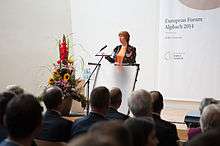European Forum Alpbach
The European Forum Alpbach (EFA) is an Austrian nonprofit organization based in Vienna, Austria. It is best known for hosting the conference of the same name in the village of Alpbach. It is an interdisciplinary platform for science, politics, business and culture with its mission cited as "connecting international decision-makers from all sectors of society with an interested audience and committed young people".
.png) | |
| Formation | 1945 (as International Summer Seminars) |
|---|---|
| Founder | Otto Molden |
| Type | Nonprofit organization |
| Legal status | Foundation |
| Headquarters | Vienna, Austria |
Official language | English, German |
President | Franz Fischler |
Key people |
|
| Website | https://www.alpbach.org/ |
History
The forum was founded in 1945 by Otto Molden, who had been active in the Austrian resistance movement. More than 4,000 people from over 70 countries accept the invitation to participate in the European Forum Alpbach each year. Participation is open to all interested parties. The events are held in the small village of Alpbach.
Program
The program is divided into several main parts
Seminar week
Up to 16 seminars are devoted to various scientific disciplines. Scientists gather for six half-day meetings. The seminar week provides an interdisciplinary conversation and offers the possibility of intensive discussions among experts. Plenary sessions on scientific, political and economic issues round out the program.
Symposia

Over the course of the two- to three-day conferences, internationally speakers discuss topics such as the built environment, education, financial markets, health, politics, law, technology and the economy. A range of breakout sessions offer participants the opportunity to delve deeper into individual subject areas. The forum also comprises shorter events such as the Tyrol Day and an interactive simulation game concerning the decision-making process in the EU.
Alpbach summer school courses
Summer school courses dedicated to the topics of entrepreneurship, facilitation and participatory leadership, European law and European integration and European health care and social systems in transition are provided for advanced students and recent graduates.
Accompanying the program of the European Forum Alpbach throughout is a comprehensive schedule of arts and culture. In exhibitions, concerts and lectures, young artists in particular are offered the opportunity to present their work to the public. There are also the spontaneously organized fireside chats in which sensitive issues can be openly discussed with well-known personalities.
Alpbach in Motion – The Alpbach Summit of Emerging Leaders
As part of the Alpbach Summit of Emerging Leaders, young European leaders meet to discuss economic systems of the future.
Alpbach Media Academy
Young journalists from all over Europe write reports about the conference under the direction of media experts.
European Forum Alpbach 2015
For the 70th anniversary of the European Forum Alpbach, hundreds of participants from different backgrounds gathered in Alpbach from August 19 to September 4, 2015, to explore and discuss the many facets of InEquality.
Presidents
- Otto Molden, 1945–1960, 1970–1992
- Heinrich Pfusterschmid-Hardtenstein, 1992–2000
- Erhard Busek, 2000–2012
- Franz Fischler, 2012–
Initiative groups and clubs

Former participants of the European Forum Alpbach founded initiative groups and clubs in more than 25 European countries (mostly in Central and Eastern Europe) in order to work together for the constant advancement of the forum. These groups and clubs promote the spirit of Alpbach in their home countries and universities and organise interdisciplinary events and lectures. They are considered to be sister organisations of the forum and most of them are giving out annual scholarships for students to attend the European Forum Alpbach.
Currently, there are initiative groups in Armenia (Yerevan), Albania (Tirana), Austria (Graz, Linz and Vienna), Belgium (Brussels), Bosnia-Herzegovina (Sarajevo), Bulgaria (Sofia), France (Paris), Germany (Berlin and Cologne), Hungary (Budapest), Kosovo (Pristina), Macedonia (Skopje), Moldova (Chişinău), Montenegro (Podgorica), Poland (Warsaw), Serbia (Belgrade), Romania (Bucharest) and Ukraine (Kiev, Lviv). Clubs exist in Austria (Burgenland, Lower Austria, Salzburg, Styria, Tyrol, Upper Austria, Vienna and Vorarlberg), Austria (Klagenfurt) / Italy / Slovenia (Senza Confini), Bulgaria, Croatia (Zagreb), Czech Republic, Greece, Italy (South Tyrol and Trentino), Liechtenstein, Middle East, Russia (Moscow), Serbia (Belgrade) and UK (London).
Past speakers
External links
![]()
- European Forum Alpbach Homepage
- Forum Alpbach Network Homepage